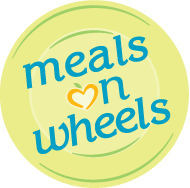Caregiving in Quicksand: When even positive change is really hard

Because Meals on Wheels is a valued resource for caregivers, we aim to provide information that caregivers may find useful. This post is part of an occasional series called “Caregiving in Quicksand,” a personal look at being a caregiver by Marketing Director Lauren Edstrom.
It’s truly amazing how we can feel totally together one moment, and then scrambling for a rescue by a true adult the next. This morning on my drive to work, I was listening to Allen Carr’s The Easy Way to Stop Smoking audiobook, drinking a Snapple and waiting to finish my gas station breakfast sandwich so I could open my king size M&M’s.
I have already talked to my mom twice this morning, which is actually a pretty good number. Yesterday she had a really good day and hardly needed any reassurance from me, so when I awoke this morning, I had hope that maybe she’d be okay today too. Unfortunately upon answering the phone her first question was “How do I get out of here?!” and I had to, once again, circle back and gently explain her situation.
Three weeks ago, my mom moved into a brand new apartment in another part of town. This apartment also happens to have some assistance for its residents, therefore making it an assisted living building. Though I wasn’t sure I was doing the right thing for her, I knew that based on what she could afford and the availability out there, she’d either have to move somewhere that would feel more “nursing home” or be on a waiting list for several years and potentially not even get into the building she was hoping for.
At this point, I explained to my mom what I had found, and that because they were so new, she’d be able to pick her apartment. Everyone including the staff would be new, so they’d all be dealing with the same learning curve. Not to mention that this building is beautiful and her apartment is probably the nicest apartment she’s had her whole life. Aside from all the positives of this new fancy space where she can just go downstairs to eat whenever it’s meal time, I was still unsure. But I knew that she would benefit from having someone around that can redirect her, reassure her and make her feel secure when I’m not around. This whole thing was supposed to take the edge off of my caregiving, so I can focus more on being with my mom rather than managing her. Boy was I wrong.
Despite talking about her move many times leading up to packing day and then living with packed boxes in her apartment, the concept of what was happening just wasn’t clicking. On moving day, she started to have a little fun despite the confusion because there were so many people there trying to make this space her own, and as familiar as possible.
In her new space, literally everything was unpacked in an afternoon. Photos and mirrors were hung in their similar places. Her room was the same as it had been – linens put away and everything had a place similar to the place it was in before. None of that mattered. This place was not hers and she didn’t understand why I was leaving her there. Furniture, photos, sheets, clothes, nothing was familiar, and I began to realize that this was not going to be even half as easy as I’d hoped.
It’s been three weeks since move in date, and I’ve learned some very important things. While my mom might have early signs of dementia, I think her anxiety is more to blame for some of her confusion. Her close friend said it best when she said to me “No one anticipated how difficult this would be for her”. She’s gotten lost on every floor. She’s forgotten how to use the elevator and pushed every button and the first time the door opens she gets off and has no way to redirect herself. She’s gone into and attempted to go into apartments that aren’t hers, ultimately making a new resident feel understandably uneasy. She’s been kind to the staff that are trying so hard to get to know her and she’s done her best to be polite and friendly to the new residents that are so eager to befriend her.
The problem with making new friends is that she can’t deal with small talk right now. Her brain is trying so hard to remember everything all the time and get her worries under control that when someone sits down to eat dinner with her and asks her where she’s from or what does she like to do, she can’t grab a hold of an answer fast enough. Then she feels embarrassed and stupid and gets up and leaves and those people wonder what they did wrong. I never thought that would be an issue, ever, because she’s always excelled at making friends.
The staff has been very helpful and very kind, but they’re new. They’re so new that they’ve never experienced anxiety or mental health struggles like my mom’s dealing with right now and they keep trying to focus on the dementia. While I agree that she’s struggling and that she clearly has some memory trouble, that’s not what’s happening right now. My mom was so comfortable and reliant on her old routine that she was able to live reasonably independent. She was still driving until three weeks ago! I had no idea how reliant she was on that routine. The staff is looking to me for suggestions, and I’m looking to them. There are some things that I think they’re learning with my mom that will help them with future residents, like positive reinforcement, validation like “I can understand why this must be so frustrating” rather than “no, you’re just confused”. I’ve had to become my mom’s biggest advocate, and between her phone calls when she’s lost and afraid, and the building’s phone calls that they’re worried about her and think she’s a memory care candidate now, I’m not getting anywhere.
If you’ve ever seen the movie “Love Actually” with Laura Linney’s character as her brother’s main confidant, you know that no matter what she’s doing when her phone rings, she takes it, and her life stops each time and has to be redirected. Her friends and family get paused and she steps away for a moment. This is my life, that’s my favorite holiday movie, and I’m literally a character in it. This has been the hardest thing I’ve ever done, mostly because it hurts so much to hear my mom in constant fear and confusion and looking to me to come and get her out of there. I’m answering the phone or even letting it go to voicemail every morning at 5:30 a.m. because she’s awake and needs me to tell her what to do next. I am exhausted from trying to live my life, be fair to my family and spend time without distraction, be present for the holidays and my son’s second birthday party, and also answering 30 phone calls per day. That is a real number, I get anywhere from 15 to 30 calls per day depending on anxiety level. It’s hard to focus on anything while your phone is ringing 30 times, but it’s also hard to enjoy peace and quiet.
I’m doing everything I can, even if that means letting her be there and making my visits more infrequent so she can adjust to her new space. Even if that means hearing that she feels like she’s in prison, and doesn’t know what to do when I’m about to go out and eat with my family. Even if that means letting my phone ring and silencing it when she calls early in the morning and I have a chance to go back to bed. Even if that means reassuring her the same way as I do my son, telling her how proud I am of her and how she’s doing a great job in spite of it all.
I’m learning. I’ve never done this before, and honestly I wouldn’t wish the past three weeks on my worst enemy. But in my heart, I know she’s safe, she’s fed and there is someone there if she truly needs help this very minute – the very minute I just might not be available because I needed to put my phone away for my own sanity and mental health. This has been so tough. It’s funny – sometimes when I don’t’ know what to do and want someone else to tell me, I just wish I could call my mom.

